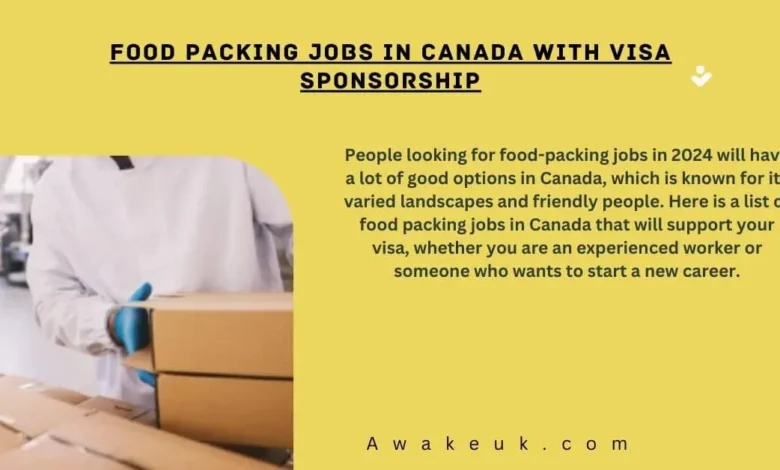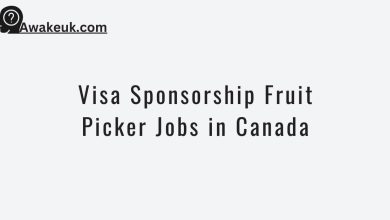Food Packing Jobs in Canada With Visa Sponsorship

People looking for food-packing jobs in 2024 will have a lot of good options in Canada, which is known for its varied landscapes and friendly people. Here is a list of food packing jobs in Canada that will support your visa, whether you are an experienced worker or someone who wants to start a new career.
Details of Food Packing Jobs in Canada With Visa Sponsorship
Education & Qualification
- Formal Education: For most food packing jobs in Canada, you don’t need a college degree or diploma or other advanced formal schooling. Most employers care more about real skills and abilities than about academic credentials.
- Work Ethic: Employers want to hire people who have a strong work ethic, which includes being reliable, on time, hardworking, and having a good attitude about work. Having these traits can help you stand out as a candidate for food packing jobs.
- Attention to Detail: When packing food, it’s important to pay close attention to the little things to make sure the job is done right and that quality standards are met. In this area, candidates who pay close attention to details and do their work carefully are highly valued.
- Teamwork skills: When you pack food, you often have to work with others to meet quality and production goals. Candidates should be able to work well with others, communicate clearly, and make good contributions to group projects.
- Previous Experience: It’s not always necessary, but it can be helpful to have worked with food before in a packaging or related job. The candidates who have worked before might know more about how to keep food safe, how to package it, and how to make it.
- On-the-Job Training: There is a lot of on-the-job training for people who want to work as food packers in Canada. This training could include things like how to keep food safe, how to use tools, how to package food, and how to check the quality of the food.
Benefits
- Legal Work: If someone sponsors your visa, you can legally work in Canada. This gives you peace of mind and security in your job situation.
- Competitive Wages: In Canada, many jobs that involve packing food offer competitive wages that are fair payment for your work and efforts.
- Comprehensive Benefits: Some companies offer full benefits packages that may include health insurance, retirement plans, paid time off, and other perks for their workers.
- Possible Career Paths: Jobs packing food can help you get into other positions in the food business. You may be able to move up in your job and gain more responsibility if you gain experience and improve your skills.
- Skill Development: You’ll learn useful skills in how to handle food, package it, check for quality, and follow safety rules. These skills will improve your professional abilities and make you more marketable.
- Cultural Experience: Working in Canada gives you a chance to learn about and experience Canadian culture, customs, and variety. This can help you grow as a person and promote cultural exchange.
- Networking Chances: You’ll have the chance to meet people who work in the food business, which could lead to future job opportunities or partnerships.
- Work-Life Balance: Many Canadian employers put a high value on work-life balance by giving flexible hours, paid time off, and supportive workplaces.
Responsibilities
- Packaging: As a food packer, your main job is to make sure that food items are packed according to set rules and guidelines. This includes putting food into cases, bags, or boxes and making sure they are sealed or closed properly.
- Packaging: It is the job of food packers to make sure that labels on packages are correct and easy to read. This could include putting on stickers with expiration dates, nutritional information, barcodes, and any other information that is needed by law.
- Quality Control: It is very important to make sure that the quality of packed foods is good. Before packaging food, packers have to check items for flaws, damage, or contamination and tell their supervisors or quality inspection staff about any problems they find.
- Food Safety Compliance: It is very important to follow the rules and standards for food safety. To keep people from getting sick and make sure the food is safe, food packers must follow good hygiene practices, wear the right safety gear, and keep the packing area clean.
- Inventory management: Part of the job is to keep track of inventory levels, make sure there is enough stock, and report gaps or overstocks. Food packers may help with inventory counts, marking new items, and setting up storage areas.
- Operating Equipment: You may have to use packing machines like filling machines, sealing machines, labelling machines, and conveyor belts. Food packers should follow the instructions for using the tools, do regular maintenance checks, and quickly report any problems.
- Working together as a team: People who pack food often have to work with others. It’s important to work together with coworkers, bosses, and other departments (like quality control, production, and the warehouse) to make sure that work gets done quickly and efficiently.
- Documentation: An important part of the job is keeping correct records and paperwork about things like labeling products, moving inventory, and packaging. This could mean keeping records by hand or using computer tools.
- Safety and Compliance: As a food packer, it’s very important that you follow the health and safety rules at work. This means using personal protective equipment (PPE), handling dangerous products (if needed), and going to safety training programs.
- Continuous Improvement: Food packers may be asked to suggest ways to make processes better, make them more efficient, or improve quality control in order to make packing work better and meet production goals.
Read Also: Utility Coal Supervisor Jobs in Canada
Salary Package
The pay for jobs packing food depends on where the job is, who hires you, and what your exact duties are. When you work in Canada, you can get perks like health insurance and other social services, and wages are often competitive. Some employers give extra benefits on top of the salary, which can make the pay package more complete.
How to Apply
- Networking: To connect with people who work in the Canadian food business, use professional networking sites like LinkedIn. Networking can help you find secret job openings and learn useful things from people who already work in your field.
- Making Custom Resumes: Make sure that your resume highlights the skills and experiences that are most important to packing food. Focus on how well you can pay attention to details, work with others, and any food handling or packing experience you may have.
- Skill Development: If you want to get better at things like food safety, packaging, and quality control, you could take online classes, attend workshops, or get certified. Showing that you are always learning and growing as a professional can make you a more appealing prospect.
- Employers: Learn about the company culture, beliefs, and expectations by researching possible employers. Make sure that your job applications are tailored to each employer’s needs and goals.
- Get ready for interviews: Practice answering common interview questions about how to pack food, work as a team, solve problems, and get used to new places. During the interview, show that you can communicate well, are flexible, and are ready to learn.
- Prepare your documents. Make sure you have all the documents you need to apply for a visa, such as proof of your schooling, work experience, financial stability, and a clear background check. To make sure the visa sponsorship process goes smoothly, make sure you carefully follow the rules set by the immigration officials.
- Cultural Adaptation: To make the change easier, learn about Canadian culture, traditions, and workplace norms. Learning about how people live, get medical care, find a place to live, and enjoy the area can help you get ready for your move.
Conclusion:
Food packing jobs in Canada are a way for foreign workers to get legal work that pays well, offers good benefits, and gives them the chance to advance in their careers. Candidates can do well in the Canadian food business and have a good work-life balance if they focus on skills, work ethic, attention to detail, teamwork, and being able to adapt to different cultures.
Frequently Asked Questions
-
How can I apply for food packing jobs in Canada?
To apply, you should focus on networking, make sure your resume highlights the skills that are relevant to the job, look for chances to improve your skills, research possible employers, get ready for interviews, gather the documents you need for a visa sponsor, and get used to Canadian culture and workplace norms.
-
What qualifications do I need for food packing jobs in Canada?
Formal schooling isn’t always needed, but applicants should have a strong work ethic, pay attention to detail, be able to work with others, and ideally have experience handling or packaging food. Most of the time, training is given on the job.



